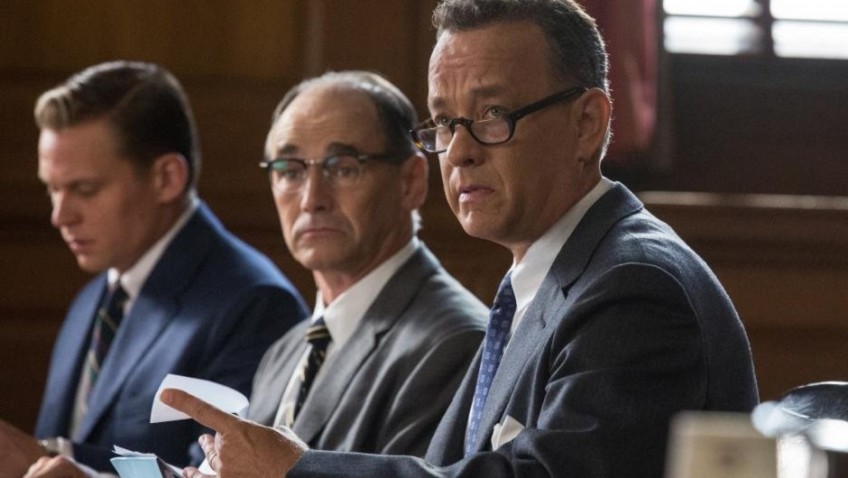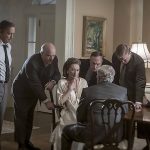Joyce Glasser reviews Bridge of Spies
It is still relatively early days in the race to identify the most likely Best Film nominations for the 2015 Academy Awards, with films such as Truth, Trumbo, Room, Joy, The Hateful Eight and Spotlight still to grace our screens. But when Steven Spielberg enters the ring with a Cold War spy thriller starring Tom Hanks and Mark Rylance and co-written by the Coen Brothers (with Suite Française writer Matt Charman), you have to take note.
It is Charman who pitched to Spielberg this wonderfully satisfying, true story of courage under duress, self-reliance, patriotism, moral choices and justice, themes which feed into Spielberg’s oeuvre wherever you look. While it might fall short of being a masterpiece, Bridge of Spies has all the elements of an Oscar contender.
In 1957, a non-descript, mild-mannered Sunday painter in his fifties returns to his dingy Brooklyn flat from a painting expedition to a river front park. He has taken something back with him from underneath the park bench. It is a coin, which he slices in half to reveal an encrypted message. At that moment, heavily armed FBI agents burst in to find Rudolf Abel, a scrawny, scraggly, unflappable man standing vulnerably in his underwear.
In his opulent, bustling office, impeccably attired James B Donovan (Hanks), a lawyer specialising in insurance claims settlements, is surprised when his superiors ask him to take on the defence of Rudolf Abel, a man accused of passing information to the Russians. The government want the public, and the world, to see that Abel receives a fair trial; but expect a minimal level of fuss and, given the public mood, a quick, guilty verdict. Donovan is seen as a safe pair of hands, but Abel is a problem. He is not talking and refuses to gain his freedom by becoming a double agent.
Although Donovan comes across as a modest, good natured, family man and protests that he is just an insurance lawyer, the law firm knows that he was a former prosecutor at the Nuremberg trials and has a reputation for being a master negotiator. Little do they realise how vital this skill will be as Donovan embarks on the unpredictable adventure of a lifetime.
As Donovan and Abel are sizing each other up in Abel’s cell, Francis Gary Powers (Austin Stowell), a young ace pilot, is being indoctrinated into a top secret mission. It is so secretive, in fact, that he is given a suicide pill to swallow if captured and encouraged to do the right thing before being tortured. When his plane is shot down, however, he is captured alive and the CIA want him back before he reveals classified information.
At around the same time a third man, with no apparent political value to any side, is arrested in Berlin and accused of being a spy. The young man is American graduate student Frederic Pryor (Will Rogers), a Yale graduate who seems to have been a victim of bad timing, choosing to do an economics degree in Berlin at the height of the Cold War. He is found trying to smuggle his professor’s pretty daughter out of East Berlin before the Wall is completed.
How these three spy cases come together is one of the pleasures of the film; best left for you to discover. You will have guessed by now that Donovan is the uniting force and joins the ranks of Spielberg’s unlikely heroes.
After having directed 1941, Empire of the Sun, Saving Private Ryan, Schindler’s List and War Horse, and having produced Flags of Our Fathers, Letters from Iwo Jima and Band of Brothers – with Hanks) there is little that Spielberg does not know about World War II. This is however, his first real spy thriller and the first (if you exclude Israeli intelligence film Munich) that is, like John Le Carré’s oeuvre and Graham Greene’s classic, The Third Man, set in the Cold War.
Spielberg’s has directed Tom Hanks in three previous films, and while other actors could have played Donovan to acclaim, the baggage and image that Hanks brings to the role makes him a more obvious candidate than does his age: The real James Donovan was only 41 in 1957 and Hanks looks his 59 years. Hanks is, for audiences, the decent guy (Toy Story), the righteous man who does the right thing (Captain Phillips, Forest Gump, Saving Private Ryan); the under-dog who finds the courage of his convictions (Philadelphia, Forrest Gump) and the family man who is surprised at his own inner strength and ability to survive (Apollo 13, Cast Away, Captain Phillips).
Great as Hanks is, Mark Rylance is the inspired casting and, as is his want, steals the show. His performance might border on the histrionic, but the film needs it. The Coen Brothers have honed Charman’s script with touches of humour, witty dialogue and fine-tuning the characterisations to play to Rylance’s strengths. When, throughout the film, Donovan asks Abel if he is worried, Rylance’s retort, delivered in his inimitable dead pan contortion, ‘Should I be?’ is right up there with ‘Go ahead, make my day’; ‘Here’s looking at you, Kid’; ‘Frankly, my dear, I don’t give a damn’ and other cinema classics.
While it is a relief that Spielberg’s trademark sentimentality (until the very end at least), emotionalism and even, at times, heavy-handedness, have been kept at bay, the film could have gone further in building the tension and dramatising to what extent Donovan was out of his depth in the murky world of post-war Berlin. On the other hand, Donovan was not a man to be underestimated. Four years after his nail-biting stand on the Glienicke Bridge, Donovan was in Cuba negotiating the exchange of $53 million in food and medicine for 1,113 American prisoners. By then, he was an old hand.




